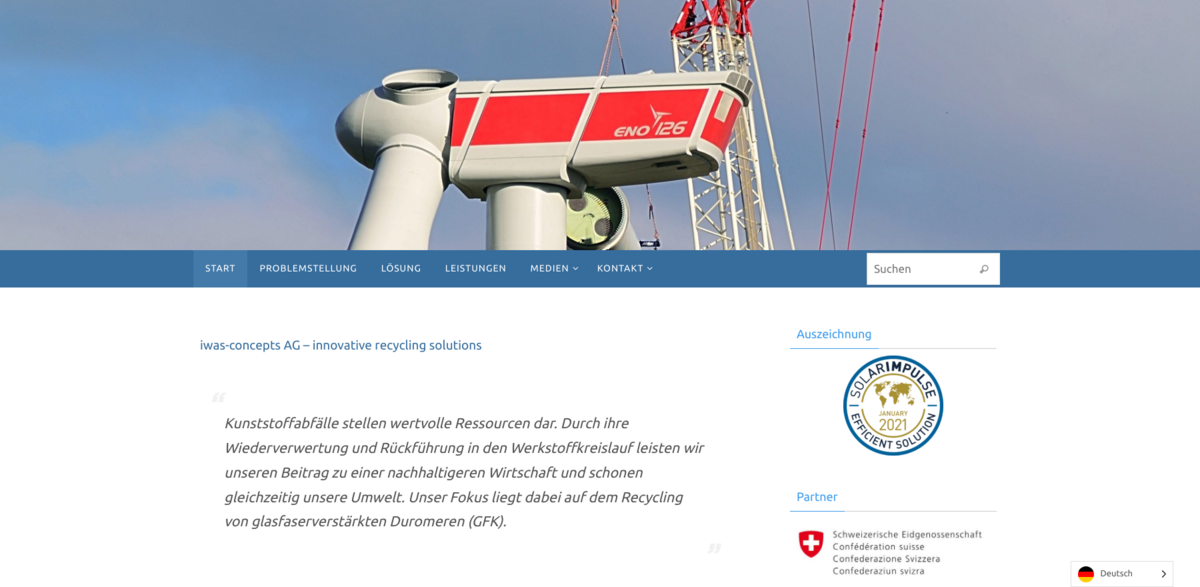What is IWAS-CONCEPTS AG All About?
IWAS-CONCEPTS AG is all about innovative recycling solutions, focusing on a pretty specific but super important material: glass fiber reinforced thermosets, or GFRP for short. Plastic waste, believe it or not, holds a lot of value. Instead of just tossing it out, recycling and feeding it back into the material cycle helps build a more sustainable economy and keeps the environment safer. That’s exactly where IWAS-CONCEPTS AG steps in — developing smart, sustainable ways to recycle GFRP and give these high-quality waste products a new life.
The Main Benefit: Turning Waste into Worth
Here’s the deal with GFRP waste in Europe:
- Over 200,000 tons of GFRP waste are generated every year.
- Currently, there’s no established, sustainable recycling process for GFRP in the circular economy sense.
- Most of this waste ends up incinerated or dumped in landfills, which isn’t great for the planet.
- IWAS-CONCEPTS AG, alongside research and industry partners, is changing that by creating innovative recycling solutions.
- The goal? To prepare GFRP waste properly and return it to the material cycle, supporting a circular economy.
The Challenge of GFRP Waste Management
GFRP waste poses a unique challenge. Unlike more common plastics, glass fiber reinforced thermosets are tough to recycle due to their complex composition. This means traditional recycling methods just don’t cut it. Without proper solutions, this valuable material often ends up as landfill or is incinerated, which wastes resources and harms the environment. IWAS-CONCEPTS AG recognizes this gap and is actively working to fill it with sustainable, scalable recycling technologies.
Innovative Solutions for a Circular Economy
What makes IWAS-CONCEPTS AG stand out is its commitment to innovation. By collaborating with experts from research and industry, the company is developing cutting-edge processes that not only recycle GFRP but do so in a way that fits perfectly within a circular economy framework. This means materials are kept in use for as long as possible, reducing the need for virgin resources and minimizing environmental impact. It’s about closing the loop — turning waste back into valuable raw materials.
Why Recycling GFRP Matters for the Environment
Recycling GFRP isn’t just a technical challenge; it’s an environmental necessity. Proper recycling helps reduce landfill use, cuts down on harmful emissions from incineration, and conserves natural resources by reusing materials. IWAS-CONCEPTS AG’s efforts contribute directly to protecting ecosystems and reducing pollution. Plus, by supporting a circular economy, the company helps create a more resilient and sustainable industrial landscape.
Project Impact on Sustainable Development Goals (SDGs)
- SDG 12: Responsible Consumption and Production – promoting sustainable management of waste and materials.
- SDG 9: Industry, Innovation, and Infrastructure – fostering innovation in recycling technologies.
- SDG 13: Climate Action – reducing emissions through better waste management.
- SDG 11: Sustainable Cities and Communities – minimizing landfill and pollution in urban areas.
- SDG 15: Life on Land – protecting ecosystems by reducing waste and pollution.
Looking Ahead: The Future of GFRP Recycling
The journey doesn’t stop here. IWAS-CONCEPTS AG is continuously pushing the boundaries of what’s possible in GFRP recycling. With ongoing research, industry partnerships, and a clear focus on sustainability, the future looks promising. The hope is to establish a fully sustainable, circular process for GFRP waste that can be adopted widely across Europe and beyond. Because, at the end of the day, turning plastic waste into valuable resources isn’t just smart — it’s essential for a healthier planet.


















